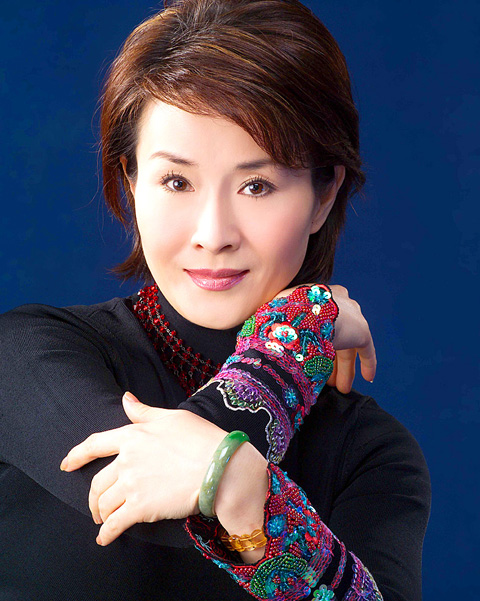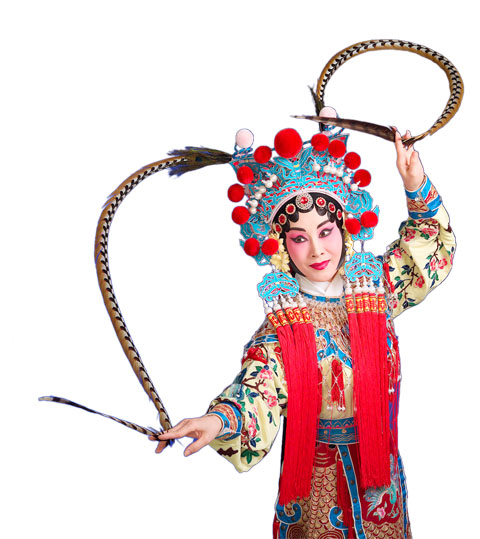Wei Hai-min (魏海敏) has achieved the considerable feat as a Chinese opera star of straddling two worlds: she is one of Beijing opera’s peerless divas, but has also joined the renegades of this tradition, such as Wu Hsing-guo (吳興國) of the Contemporary Legend Theater (當代傳奇劇場), in leading a push to create a new kind of modern Chinese theater.
In an interview for a 2006 revival of Wu’s City of Desire (慾望城國), an operatic version of Macbeth, Wei said she drifted into contemporary theater more by accident than design, and that she found the effort of trying to get inside the character of Lady Macbeth almost insuperable at first. She explained in a recent interview with Taipei Times that this was because the modern techniques of character acting were antithetical to everything she had been taught as a performer in a highly formalized medium. To take up this role, she had to overcome what Brecht has called the “alienation effect of Chinese acting,” by creating more emotionally direct and nuanced expressions of the characters she performed, without casting aside the formal aesthetic that is the foundation of Beijing opera. She has been a master of shifting from one style to another ever since.
Wei might be happy to explore new regions of theater and the ideas of different dramatic traditions in her work, but she is absolutely clear that her success and subsequent fame are built on the rigorous training she received as a member of the Hai Guang Chinese Opera School (海光劇校), a training institution closely linked to the military and one that offers a very similar kind of discipline. It has since become incorporated into the National Guoguang Opera Company (國立國光劇團), with which Wei retains close relations.

PHOTO: COURTESY OF CHING HUA BRIDAL ART
In a biographical account published in 2006, Wei recalls a family life overshadowed by the desertion of her mother and the efforts of her father, a retired soldier, to make ends meet and care for her and her two sisters.
When she became a student at Hai Kuang, she was separated from her family except for occasional visits, and theater became a defining part of her life. Possessing a fierce pride, Wei sees her life before the theater as a preparation for her life as a performer. Small wonder that the title of the account of her life so far is titled simply Actress (女伶). “Off the stage I was a very ordinary child,” she writes in this account. “But on stage, I was extraordinary.”
“People often ask me how I remember all the lyrics,” she said. “But performance isn’t about memorizing words. The most important thing is for your body to remember every nuance of a character. Only in that way can you make the character your own. As for life off the stage, I’m not so concerned about that.”

PHOTO: COURTESY OF THE WEI HAI-MIN CHINESE OPERA FOUNDATION
After graduating and becoming a member of the Hai Kuang Opera Troupe (海光劇團), Wei had aspirations beyond the world of opera she saw in Taiwan. “At that time, most of the performers where content simply to follow the accepted forms, never stepping out of the constraints of convention. Performing this way time and time again, you get bored,” she wrote. This sense of frustration led her in two seemingly opposite directions simultaneously. In 1986, she teamed up with Wu Hsing-guo and his newly formed Contemporary Legend Theater to create the role of Lady Macbeth in a new Beijing opera incarnation. This was taking Beijing Opera into new realms and disgusted many of her conservative fans at the time.
In 1988, she asked to be accepted as a disciple of Mei Baojiu (梅葆玖), a highly respected performer and the second generation master of the Mei Lanfang (梅蘭芳) style. Due to cross-strait political tensions, she did not realize this ambition until 1991, but she is now accepted as a major figure of the third generation of the Mei transmission. Wei sees these two strands, tradition and innovation, as inextricably linked, not just in her own career, but also in the future of Beijing opera.
“It’s really up to (the artists) of every country to decide how they want to preserve their heritage. You don’t preserve culture by putting it into a museum. Preservation and development must go hand in hand ... that’s the only way to make it matter. If you just keep it as it was, unchanging, then ... I don’t know ... I guess it’s up to the artist. They have to decide if what they do is merely a way of making a living, or whether they what to involve themselves in their art and have something of their own to pass on to the next generation.”
“As to the way things were in the past ... we’re lucky these days. There is so much recording technology available, so if we want a record of how things were, we can make a recording. The artists should get on with developing their art,” she told Taipei Times.
In the central role of Cao Chi-chiao (曹七巧) in The Golden Cangue (金鎖記), which was created for Wei by Wang An-chi (王安祈), the artistic director of The National Guoguang Opera Company (國立國光劇團), and premiered in 2005, Wei sees the creation of a contemporary Beijing opera repertoire. She believes this is essential to the survival of her art. “I think if you are able to be open-minded about the possibilities, then you can take command of virtually any role. But it takes time. In the past, most new operas where just one-off productions ... It is impossible to make these really good. With The Golden Cangue, we have it revived twice since it premiered, and this provides us with the space to fine tune the performance,” Wei said.
Speaking about the future of Beijing opera, Wei said that it saw its peak in the first half of the 20th century, and “nothing remains popular forever.” Nevertheless, she believes that it expresses something of the Chinese people as a whole, and also of her own identity as an artist.
“It (Beijing opera) is an expression of the ideas and beliefs of the Chinese people and the ways they are expressed (in a social context) ... regardless of whether these are ideas of beauty or of morality. This whole aspect of the mind and spirit of the Chinese people has been passed down through these theatrical works. It is so representative of what we are. But times have changed, and people believe that these operas are outdated. But if you look at them closely, you will see that there is still so much within Beijing opera that can move you, that will really touch your heart,” she said.
“Accumulated artistic achievement gives a country weight — like ballast (on a ship). When a nation is very young, it can have abundant vitality, but it has nothing accumulated. Chinese culture has accumulated so much, too much ... so much indeed that we sometimes feel that it might be better just to push it aside. But as a member of this global community, you have no choice but to explore your own history, the ancient things that came before us. These things are integral to who and what we are. This creates a weight, provides a quality that gives a person value and makes it possible to live in this world.”

Exceptions to the rule are sometimes revealing. For a brief few years, there was an emerging ideological split between the Democratic Progressive Party (DPP) and Chinese Nationalist Party (KMT) that appeared to be pushing the DPP in a direction that would be considered more liberal, and the KMT more conservative. In the previous column, “The KMT-DPP’s bureaucrat-led developmental state” (Dec. 11, page 12), we examined how Taiwan’s democratic system developed, and how both the two main parties largely accepted a similar consensus on how Taiwan should be run domestically and did not split along the left-right lines more familiar in

As I finally slid into the warm embrace of the hot, clifftop pool, it was a serene moment of reflection. The sound of the river reflected off the cave walls, the white of our camping lights reflected off the dark, shimmering surface of the water, and I reflected on how fortunate I was to be here. After all, the beautiful walk through narrow canyons that had brought us here had been inaccessible for five years — and will be again soon. The day had started at the Huisun Forest Area (惠蓀林場), at the end of Nantou County Route 80, north and east

Specialty sandwiches loaded with the contents of an entire charcuterie board, overflowing with sauces, creams and all manner of creative add-ons, is perhaps one of the biggest global food trends of this year. From London to New York, lines form down the block for mortadella, burrata, pistachio and more stuffed between slices of fresh sourdough, rye or focaccia. To try the trend in Taipei, Munchies Mafia is for sure the spot — could this be the best sandwich in town? Carlos from Spain and Sergio from Mexico opened this spot just seven months ago. The two met working in the

This month the government ordered a one-year block of Xiaohongshu (小紅書) or Rednote, a Chinese social media platform with more than 3 million users in Taiwan. The government pointed to widespread fraud activity on the platform, along with cybersecurity failures. Officials said that they had reached out to the company and asked it to change. However, they received no response. The pro-China parties, the Chinese Nationalist Party (KMT) and Taiwan People’s Party (TPP), immediately swung into action, denouncing the ban as an attack on free speech. This “free speech” claim was then echoed by the People’s Republic of China (PRC),